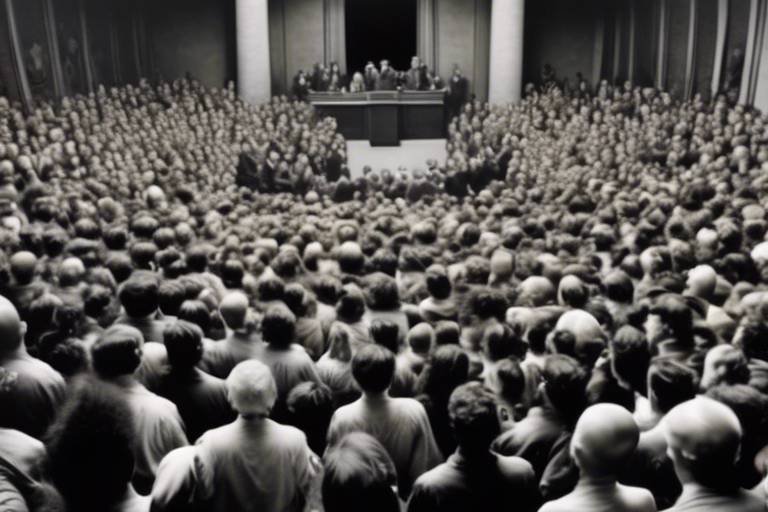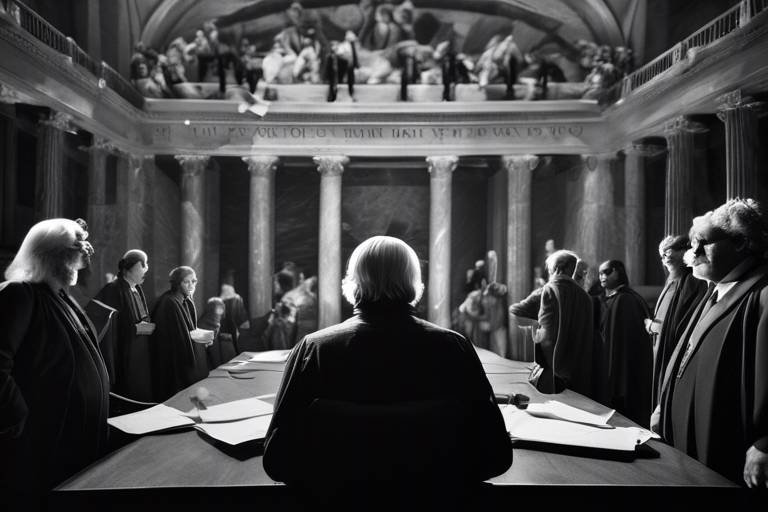Can Philosophy Contribute to Conflict Resolution in Politics?
In a world where political disagreements often escalate into heated confrontations, the question arises: can philosophy offer a way out? The answer is a resounding yes! Philosophy, with its rich tapestry of ideas and theories, provides a unique lens through which we can understand and address conflicts in politics. By examining the fundamental principles of ethics, duty, and dialogue, we can uncover pathways to not just resolve disputes, but to foster a culture of understanding and cooperation.
Consider this: when politicians engage in debates, they often focus on winning rather than understanding. This combative approach can lead to polarization, where opposing sides become entrenched in their positions. However, by applying philosophical principles, we can shift the focus from mere victory to seeking common ground. Imagine a political landscape where dialogue reigns supreme, where leaders are guided by ethical considerations and a commitment to justice. This is not merely a dream; it is a possibility grounded in philosophical thought.
Philosophy encourages us to ask deep questions about our values, our responsibilities, and the consequences of our actions. In the realm of politics, this means that leaders can benefit from reflecting on ethical frameworks that prioritize the well-being of all citizens. For instance, when faced with a contentious policy decision, a politician might consider not just the immediate effects on their constituents, but also the broader implications for society as a whole. This kind of reflective thinking can pave the way for more equitable and just outcomes.
Moreover, philosophical dialogue can serve as a powerful tool for conflict resolution. By fostering conversations that emphasize empathy and understanding, conflicting parties can find common ground even in their deepest disagreements. Think of philosophical dialogue as a bridge that connects two islands of differing opinions. Through respectful discourse, these islands can be linked, allowing for the exchange of ideas and the possibility of consensus.
Ultimately, the intersection of philosophy and politics is not just a theoretical exercise; it has real-world implications. By embracing philosophical principles, politicians can cultivate a more harmonious political environment, one that values dialogue over division. In the following sections, we will delve deeper into how ethical considerations and various philosophical theories can inform political decision-making and conflict resolution.

The Role of Ethics in Politics
When we think about politics, it's easy to get caught up in the drama, the debates, and the endless news cycles. But at the heart of political decision-making lies a fundamental question: What is the right thing to do? This is where ethics swoops in like a superhero, guiding politicians in their choices during times of conflict. It's not just about winning votes or gaining power; it's about making decisions that are just and fair. Ethical considerations can serve as a compass, helping leaders navigate the murky waters of political disagreements.
Imagine a world where politicians prioritize ethical principles over personal gain. They would consider the impact of their decisions on all stakeholders, not just the loudest voices in the room. This approach fosters a sense of responsibility and accountability. In essence, ethics in politics can be seen as the glue that holds society together. It encourages leaders to look beyond their immediate interests and consider the broader implications of their actions.
One of the key roles of ethics in politics is to promote transparency and integrity. When leaders adhere to ethical standards, they inspire trust among their constituents. This trust is crucial, especially in times of crisis when people are looking for guidance and reassurance. For instance, if a politician openly discusses their decision-making process and the ethical considerations involved, it can significantly enhance public confidence. Conversely, when ethical lapses occur, they can lead to scandals that undermine the very foundation of democratic governance.
Furthermore, ethical frameworks can help in resolving conflicts by providing a structured approach to decision-making. For example, politicians can rely on established ethical theories such as utilitarianism, which emphasizes the greatest good for the greatest number, or deontological ethics, which focuses on duties and rules. By grounding their decisions in these principles, politicians can create a more just and equitable political landscape.
However, it's important to note that ethical dilemmas are often complex and multifaceted. Politicians may face situations where ethical principles clash, leading to difficult choices. For example, a leader might have to decide between implementing a policy that benefits the majority while potentially harming a minority group. In such cases, the role of ethics becomes even more critical, as it encourages leaders to engage in thoughtful deliberation and seek solutions that minimize harm while maximizing benefits.
In summary, ethics plays a pivotal role in politics by guiding decision-making, fostering trust, and providing frameworks for conflict resolution. As we navigate the challenges of modern governance, it's essential for political leaders to embrace ethical principles wholeheartedly. After all, in the grand theater of politics, the real winners are those who prioritize justice and fairness over partisanship and power.

When it comes to resolving conflicts, especially in the murky waters of politics, philosophical theories offer invaluable insights. They serve as a compass, guiding us through the complexities of human interactions and societal disagreements. At the heart of these theories lies the understanding that every conflict is not just a clash of interests but a profound divergence of values, beliefs, and principles. By applying various philosophical frameworks, we can dissect these conflicts, understand their roots, and develop strategies to navigate them effectively.
One of the most significant contributions of philosophy to conflict resolution is its ability to provide a structured approach to analyzing disagreements. For instance, theories such as utilitarianism, deontology, and virtue ethics offer distinct lenses through which we can evaluate political disputes. Each of these theories presents its own set of principles that can help in understanding the motivations behind conflicting parties and in finding common ground.
Utilitarianism, for example, encourages us to consider the outcomes of our actions and decisions. It prompts us to ask, "What will produce the greatest good for the greatest number?" This question is fundamental in political contexts, where decisions often impact large populations. However, while utilitarianism seeks to maximize overall happiness, it can sometimes overlook the rights and needs of minorities. This brings us to the next theory: deontology, which emphasizes duties and rules. Deontological ethics urges politicians to uphold justice and rights, regardless of the consequences. It raises the question, "What are our moral obligations in this situation?" This perspective is crucial, especially when the stakes are high and the potential for harm is significant.
Moreover, virtue ethics shifts the focus from rules and outcomes to the character of the individuals involved. It asks us to consider the virtues that should guide our actions. In a political context, this means fostering qualities such as integrity, empathy, and courage among leaders and citizens alike. By promoting virtuous behavior, we can create an environment where constructive dialogue and mutual respect flourish, thus paving the way for effective conflict resolution.
In summary, philosophical theories provide a rich tapestry of ideas that can illuminate the path toward resolving political conflicts. By understanding and applying these theories, we can better navigate the complexities of human interactions and work toward solutions that are not only effective but also just and fair. As we delve deeper into these philosophical frameworks, we will uncover practical applications and real-world examples that demonstrate their relevance in today’s political landscape.

Utilitarianism in Political Decision-Making
Utilitarianism, a philosophical theory primarily associated with thinkers like Jeremy Bentham and John Stuart Mill, advocates for actions that promote the greatest good for the greatest number. In the realm of politics, this principle can serve as a valuable guide for decision-makers who are often faced with complex dilemmas that impact diverse populations. Imagine a politician standing at a crossroads, where one path leads to immediate benefits for a few, while the other promises long-term advantages for the majority. Which path should they choose? This is where utilitarianism shines, providing a framework that prioritizes collective welfare over individual interests.
When applied to political decision-making, utilitarianism encourages leaders to weigh the consequences of their actions. They must ask themselves, “How will this decision affect the overall happiness and well-being of the community?” This approach can be particularly useful during times of conflict, as it pushes leaders to consider not just their political agendas, but also the broader implications of their choices. For instance, implementing policies that benefit the majority—such as healthcare reforms or educational improvements—can serve as a means to unite a divided populace, fostering a sense of shared purpose and collaboration.
However, the application of utilitarianism in politics is not without its challenges. Politicians must navigate the delicate balance between the needs of the majority and the rights of minorities. In some cases, pursuing the greatest good can lead to the marginalization of vulnerable groups. For example, a government might decide to allocate resources to a popular public project while neglecting the needs of a minority community. This raises important ethical questions: Is it justifiable to sacrifice the well-being of a few for the happiness of the many? This dilemma highlights the potential pitfalls of a strictly utilitarian approach, where the ends are prioritized over the means.
To illustrate the practical application of utilitarianism in political decision-making, consider the following table that outlines some real-world scenarios:
| Scenario | Utilitarian Decision | Outcome |
|---|---|---|
| Healthcare Reform | Expand access to healthcare for all | Improved public health and increased productivity |
| Infrastructure Investment | Invest in public transportation | Reduced traffic congestion and environmental benefits |
| Tax Policy Changes | Increase taxes on the wealthy to fund social programs | Enhanced support for low-income families |
These scenarios exemplify how utilitarian principles can guide political leaders toward decisions that maximize collective welfare. However, it’s vital to remember that the effectiveness of utilitarianism in politics hinges on careful consideration of all stakeholders involved. By actively engaging with diverse perspectives and striving for inclusive policies, politicians can harness the power of utilitarianism to foster harmony and progress within society.

Challenges of Utilitarian Approaches
Utilitarianism, while appealing in its promise of maximizing overall happiness, is not without its challenges. One of the primary criticisms is that it can lead to the neglect of minority rights. Imagine a scenario where the majority in a society decides to impose certain policies that benefit them but severely impact a smaller group. The utilitarian principle, which focuses on the greatest good for the greatest number, might justify such actions, leaving the minority voiceless and vulnerable. This raises a critical question: can a philosophy that overlooks the rights of individuals truly be considered ethical?
Another significant challenge is the difficulty in measuring happiness or utility. How do we quantify happiness? Is it based on wealth, health, or perhaps personal freedom? The subjective nature of happiness complicates the implementation of utilitarian principles in political decision-making. For instance, if a government decides to allocate funds towards building a new highway that benefits many, but at the cost of displacing a small community, how do we measure the happiness gained by the majority against the suffering of the minority? This ambiguity can lead to contentious debates and further conflict.
Moreover, utilitarianism often faces criticism for its potential to justify immoral actions. In a bid to achieve the greatest good, actions that would typically be deemed unethical may be rationalized. For example, if a government were to sacrifice the rights of a few to ensure the stability of the majority, it could be argued that such a decision is justified under utilitarian principles. However, this brings us back to the question of ethics: does the end truly justify the means?
Lastly, there is the issue of short-term versus long-term consequences. Utilitarian approaches often focus on immediate results, which can lead to decisions that are beneficial in the short term but detrimental in the long run. For instance, a government may choose to implement a policy that boosts economic growth quickly, but if this policy leads to environmental degradation, the long-term consequences could outweigh the initial benefits. This inconsistency can create a cycle of conflict as different groups advocate for their own interpretations of what constitutes 'the greater good.'
In summary, while utilitarianism offers a framework for addressing political conflicts, its challenges cannot be ignored. The potential neglect of minority rights, the difficulty in measuring happiness, the justification of immoral actions, and the tension between short-term and long-term consequences all highlight the complexities inherent in applying this philosophical approach to real-world politics. As we navigate these challenges, it becomes clear that a multifaceted approach to conflict resolution, integrating various philosophical perspectives, may be necessary to achieve truly just outcomes.
- What is utilitarianism? Utilitarianism is a philosophical theory that suggests the best action is the one that maximizes overall happiness or utility.
- Why is utilitarianism criticized? Critics argue that it can overlook minority rights, justify immoral actions, and struggle with measuring happiness effectively.
- Can utilitarianism be applied to political decision-making? Yes, but it requires careful consideration of the consequences and ethical implications of decisions, especially regarding minority rights.
- What are some alternatives to utilitarianism in conflict resolution? Other philosophical approaches, such as deontological ethics or virtue ethics, may provide valuable insights and frameworks for addressing political conflicts.

Case Studies of Utilitarianism in Politics
Utilitarianism, the ethical theory that advocates for actions that maximize overall happiness, has been a guiding principle in various political scenarios throughout history. One of the most notable examples can be found in the realm of public health policy. During the early 2000s, the United Kingdom faced a significant decision regarding the allocation of resources for the National Health Service (NHS). In this case, policymakers had to determine how to best distribute limited resources to achieve the greatest health benefits for the population. By applying a utilitarian framework, they prioritized treatments that would yield the most significant positive impact on public health, ultimately leading to improved outcomes for a larger segment of the population.
Another compelling case study is the implementation of the Affordable Care Act (ACA) in the United States. The ACA aimed to increase healthcare accessibility for millions of Americans who were previously uninsured. The underlying utilitarian principle here was clear: by expanding healthcare coverage, the government sought to enhance the overall well-being of its citizens. While the ACA faced considerable opposition, its proponents argued that the benefits—such as reduced mortality rates and improved quality of life—outweighed the costs. This example illustrates how a utilitarian approach can drive significant policy changes that aim for the greater good, even in the face of political contention.
However, not all applications of utilitarianism in politics have been successful. A cautionary tale can be seen in the Indian government's response to the COVID-19 pandemic. Initially, the government imposed strict lockdown measures to control the virus's spread, which were justified on utilitarian grounds. While these measures were intended to protect public health, they inadvertently led to severe economic repercussions and significant hardships for the most vulnerable populations. This situation exemplifies the challenges of utilitarianism: the pursuit of the greater good can sometimes overlook the needs and rights of minority groups, leading to unintended consequences that can exacerbate existing inequalities.
To further illustrate the complexities of utilitarianism in political decision-making, we can analyze the following table that summarizes various case studies:
| Case Study | Utilitarian Principle Applied | Outcome | Challenges Faced |
|---|---|---|---|
| UK NHS Resource Allocation | Maximizing public health benefits | Improved health outcomes for many | Resource limitations |
| Affordable Care Act (ACA) | Expanding healthcare access | Increased coverage for millions | Political opposition and implementation challenges |
| COVID-19 Lockdowns in India | Protecting public health | Initial control of virus spread | Economic hardship for vulnerable populations |
These case studies highlight the dual-edged nature of utilitarianism in political contexts. While the theory provides a robust framework for making decisions that aim to benefit the majority, it also raises critical questions about the treatment of minority rights and the potential for unintended consequences. As politicians and policymakers navigate these ethical waters, the challenge remains to balance the greater good with fairness and justice for all.

Deontological Ethics and Political Obligations
Deontological ethics, rooted in the philosophy of Immanuel Kant, emphasizes the importance of rules, duties, and obligations in moral decision-making. In the realm of politics, this ethical framework serves as a critical lens through which leaders can assess their responsibilities to uphold justice and protect the rights of individuals. Unlike consequentialist theories, which focus primarily on the outcomes of actions, deontological ethics insists that certain actions are inherently right or wrong, regardless of their consequences. This distinction is vital in political contexts where the moral implications of decisions can significantly impact society.
Political leaders often face dilemmas that require them to navigate complex moral landscapes. For instance, they might grapple with issues such as civil liberties, human rights, and social justice. Deontological ethics provides a robust framework for these leaders to evaluate their obligations. Here are some key principles that can guide politicians in their decision-making processes:
- Respect for Persons: Deontological ethics advocates for treating individuals as ends in themselves, not merely as means to an end. This principle underscores the importance of respecting the inherent dignity of all individuals, which is crucial in political discourse.
- Universalizability: Kant’s categorical imperative suggests that one should act only according to that maxim which they can will to become a universal law. This principle encourages consistency and fairness in political decisions.
- Duty to Uphold Justice: Politicians have a duty to ensure that justice is served, which includes protecting the rights of the marginalized and ensuring equitable treatment under the law.
In practice, applying deontological ethics can help prevent political leaders from making decisions based solely on expediency or popularity. For example, consider a politician faced with the decision to implement a policy that benefits the majority but infringes on the rights of a minority group. A deontological approach would compel the leader to consider the moral implications of such a decision, advocating for the protection of individual rights even if it means sacrificing some degree of collective benefit.
Moreover, the application of deontological principles in politics can enhance public trust in governmental institutions. When citizens perceive that their leaders are committed to upholding ethical standards and respecting their rights, it fosters a sense of legitimacy and accountability. This, in turn, can lead to a more engaged and informed electorate, as people feel their voices matter in a system guided by moral obligations.
However, it is essential to recognize that deontological ethics is not without its challenges. Critics argue that strict adherence to rules can sometimes lead to rigid and inflexible decision-making, potentially overlooking the complexities of real-world situations. Therefore, while deontological ethics provides a valuable framework, it should be complemented by other ethical considerations to create a more holistic approach to political obligations.
In conclusion, deontological ethics serves as a vital tool for political leaders, guiding them in their responsibilities to uphold justice and protect individual rights. By prioritizing moral duties over mere outcomes, politicians can navigate the intricate landscape of political decision-making with integrity and purpose. This ethical framework not only enhances the quality of governance but also contributes to a more just and equitable society.
Q: What is deontological ethics?
A: Deontological ethics is a moral philosophy that emphasizes the importance of rules and duties in ethical decision-making, regardless of the consequences of those actions.
Q: How does deontological ethics apply to politics?
A: In politics, deontological ethics guides leaders to prioritize moral obligations, such as upholding justice and protecting individual rights, over simply seeking favorable outcomes.
Q: What are some challenges of applying deontological ethics in political decision-making?
A: Some challenges include the potential for rigidity in decision-making and the difficulty of balancing conflicting duties in complex situations.
Q: Can deontological ethics coexist with other ethical theories?
A: Yes, deontological ethics can be complemented by other ethical theories, such as consequentialism, to create a more comprehensive approach to moral decision-making in politics.

Philosophical Dialogue as a Conflict Resolution Tool
In the realm of politics, conflict is as inevitable as the changing seasons. Political disagreements can often escalate into heated confrontations, leaving little room for constructive dialogue. This is where philosophical dialogue comes into play, serving as a powerful tool for conflict resolution. By fostering understanding and empathy among conflicting parties, philosophical dialogue encourages a space where ideas can be exchanged thoughtfully and respectfully. But how does this work in practice? Let's dive into the nuances.
At its core, philosophical dialogue is about more than just exchanging arguments; it's about engaging deeply with differing perspectives. This type of dialogue invites participants to explore the underlying values and beliefs that shape their viewpoints. Instead of merely trying to win an argument, individuals are encouraged to listen actively and reflectively. This approach can transform a contentious debate into a collaborative search for common ground, making it easier to navigate through the turbulent waters of political conflict.
Implementing philosophical dialogue in political contexts can be achieved through various methods. For instance, establishing ground rules that promote respect and openness can create a safe environment for discussion. Here are some effective techniques:
- Active Listening: Encourage participants to listen to understand, not just to respond. This fosters a deeper connection and promotes empathy.
- Open-Ended Questions: Use questions that invite exploration rather than simple yes or no answers. This can lead to richer discussions.
- Reflection: Encourage participants to paraphrase what they hear. This not only confirms understanding but also shows respect for the speaker’s perspective.
Moreover, historical examples highlight the efficacy of philosophical dialogue in resolving political conflicts. Take, for instance, the dialogues that took place during the Truth and Reconciliation Commission in South Africa. This initiative aimed to address the injustices of apartheid and involved open discussions between victims and perpetrators. Through philosophical dialogue, participants were able to share their stories, confront painful truths, and ultimately foster a sense of healing and understanding. This powerful example illustrates how dialogue can pave the way for reconciliation, even in the most polarized environments.
In addition, the use of philosophical dialogue can be particularly beneficial in today’s politically charged atmosphere, where social media often amplifies divisive rhetoric. By promoting dialogue that prioritizes philosophical inquiry, we can counteract the noise and encourage a more thoughtful discourse. Imagine a political landscape where leaders and citizens alike engage in conversations that prioritize understanding over winning. Wouldn’t that be a refreshing change?
In conclusion, philosophical dialogue is not just a theoretical concept; it is a practical approach that can significantly contribute to conflict resolution in politics. By fostering an environment of respect, understanding, and empathy, we can address political disagreements more effectively. As we continue to navigate the complexities of modern politics, let us embrace the power of philosophical dialogue and strive for a more harmonious coexistence.
- What is philosophical dialogue? Philosophical dialogue is a method of discussion that emphasizes understanding and exploration of different perspectives, rather than simply trying to win an argument.
- How can philosophical dialogue help in politics? It fosters empathy and understanding, allowing conflicting parties to find common ground and resolve disputes peacefully.
- Are there successful examples of philosophical dialogue in political contexts? Yes, historical instances like the Truth and Reconciliation Commission in South Africa demonstrate how dialogue can lead to healing and resolution.

Techniques for Effective Dialogue
Effective dialogue is not just about exchanging words; it’s about fostering genuine understanding and empathy between conflicting parties. To achieve this, several key techniques can be employed. First and foremost, active listening is crucial. This means truly hearing what the other person is saying, rather than just waiting for your turn to speak. When individuals feel heard, they are more likely to engage openly and honestly, paving the way for a productive conversation.
Another essential technique is to establish a safe environment for dialogue. This involves creating a space where participants feel comfortable expressing their thoughts and feelings without fear of judgment or retribution. Ground rules can help in this regard, such as agreeing to respect each other's viewpoints and avoiding personal attacks. By fostering a respectful atmosphere, dialogue can flourish, allowing for deeper exploration of the issues at hand.
Moreover, utilizing open-ended questions can significantly enhance the quality of dialogue. Instead of asking questions that can be answered with a simple "yes" or "no," encourage participants to elaborate on their thoughts. For example, instead of asking, "Do you agree with this policy?" you might ask, "What are your thoughts on how this policy affects our community?" This approach invites more nuanced responses and can uncover underlying concerns that may not have been initially apparent.
In addition, employing reflection techniques can help clarify and validate participants' feelings. When someone expresses a concern, paraphrasing their words back to them can demonstrate that you are genuinely engaged. For instance, you might say, "It sounds like you’re worried about the impact of this decision on our local economy." This not only shows that you are listening but also encourages further dialogue by prompting the speaker to elaborate.
Lastly, it’s essential to maintain a solution-oriented mindset. Rather than getting bogged down in blame or past grievances, focus on finding common ground and exploring potential solutions. This shift in perspective can transform a contentious debate into a collaborative effort to resolve the conflict. By emphasizing shared goals and interests, participants can work together towards a mutually beneficial outcome.
In summary, effective dialogue techniques such as active listening, creating a safe environment, asking open-ended questions, employing reflection techniques, and maintaining a solution-oriented mindset can significantly enhance political discussions. These methods not only facilitate better communication but also foster a culture of understanding and respect, essential for resolving conflicts peacefully.
- What is the importance of dialogue in conflict resolution?
Dialogue is crucial as it helps to bridge gaps in understanding, allowing conflicting parties to see each other's perspectives and work towards a common solution. - How can I improve my active listening skills?
Practice focusing entirely on the speaker, avoid interrupting, and ask clarifying questions to ensure you understand their point of view. - What are some common barriers to effective dialogue?
Barriers can include preconceived notions, emotional reactions, and a lack of trust among participants. - Can dialogue really change people's minds?
Yes, when conducted effectively, dialogue can lead to greater understanding and potentially shift perspectives as individuals consider new information.

Historical Examples of Philosophical Dialogue
Throughout history, there have been numerous instances where philosophical dialogue has played a pivotal role in resolving political conflicts. These dialogues often serve as a bridge between opposing views, fostering understanding and empathy. One of the most notable examples is the Peace of Westphalia in 1648, which ended the Thirty Years' War in Europe. This series of treaties was not merely a political maneuver; it was deeply rooted in philosophical discussions about sovereignty and the rights of states. The negotiators engaged in extensive dialogue, emphasizing the importance of mutual respect and coexistence, which ultimately laid the groundwork for modern international law.
Another significant example can be found in the American Civil Rights Movement during the 1960s. Philosophers like Martin Luther King Jr. utilized dialogue as a tool for change. His approach was heavily influenced by the principles of nonviolence and moral responsibility, which he articulated through open discussions and peaceful protests. King's famous "Letter from Birmingham Jail" is a prime example of how philosophical reasoning can be employed to challenge unjust laws and inspire collective action. In this letter, he argued that "injustice anywhere is a threat to justice everywhere," illustrating the interconnectedness of societal values and ethical obligations.
Moreover, the Truth and Reconciliation Commission in South Africa following the end of apartheid is a modern testament to the power of philosophical dialogue. The Commission was established to address the atrocities committed during the apartheid era through open conversations between victims and perpetrators. This initiative was grounded in the philosophy of Ubuntu, which emphasizes communal relationships and the inherent dignity of every individual. By facilitating dialogues that acknowledged past injustices, the Commission aimed to foster healing and build a more inclusive society.
These historical examples highlight the profound impact that philosophical dialogue can have on political conflict resolution. They remind us that engaging in meaningful conversations can pave the way for understanding and peace. As we reflect on these instances, it becomes clear that philosophy is not just an abstract discipline; it's a practical tool that can guide us in navigating the complexities of human interactions. By embracing philosophical dialogue, we can work towards a future where conflicts are resolved through understanding rather than violence.
- What is philosophical dialogue? Philosophical dialogue involves discussions that focus on fundamental questions about ethics, justice, and human values, aimed at fostering understanding and resolving conflicts.
- How can philosophical dialogue help in politics? It can help by promoting empathy, understanding, and collaborative problem-solving among conflicting parties.
- Are there modern examples of philosophical dialogue in politics? Yes, contemporary movements for social justice often utilize philosophical dialogue to address issues and promote change.
Frequently Asked Questions
- How can philosophy help in resolving political conflicts?
Philosophy offers frameworks that encourage critical thinking and ethical considerations, enabling politicians to approach conflicts with a mindset geared towards understanding and collaboration. By applying philosophical principles, political leaders can foster dialogue and seek resolutions that are fair and just for all parties involved.
- What role do ethical considerations play in political decision-making?
Ethics are foundational in guiding politicians to make choices that reflect justice and fairness. When faced with conflicts, ethical frameworks help leaders evaluate the implications of their decisions on various stakeholders, ensuring that the outcomes are not only beneficial but also morally sound.
- Can you explain utilitarianism in the context of politics?
Utilitarianism is a philosophical theory that promotes actions that maximize happiness and well-being for the majority. In political decision-making, this means prioritizing policies that benefit the greatest number of people, though it raises questions about the rights of minority groups and the potential for their needs to be overlooked.
- What challenges does utilitarianism face in political contexts?
While utilitarianism provides a clear approach to decision-making, its challenges include the risk of ignoring minority rights and the complexity of measuring overall happiness. Politicians must navigate these pitfalls carefully to ensure that their actions do not inadvertently harm vulnerable populations.
- How does deontological ethics influence political obligations?
Deontological ethics emphasizes the importance of rules and duties, guiding political leaders to uphold justice and rights regardless of the consequences. This approach ensures that actions taken during conflicts are aligned with moral principles, promoting accountability and integrity in governance.
- What techniques can enhance philosophical dialogue in politics?
Effective dialogue techniques include active listening, open-ended questioning, and creating a safe space for discussion. These strategies encourage participants to express their viewpoints and foster a deeper understanding of differing perspectives, ultimately leading to more productive conflict resolution.
- Are there historical examples of successful philosophical dialogue in politics?
Yes, there are several notable instances where philosophical dialogue has led to successful conflict resolution. Historical examples include peace negotiations that utilized dialogue to bridge gaps between opposing factions, demonstrating the power of conversation in achieving mutual understanding and compromise.



















